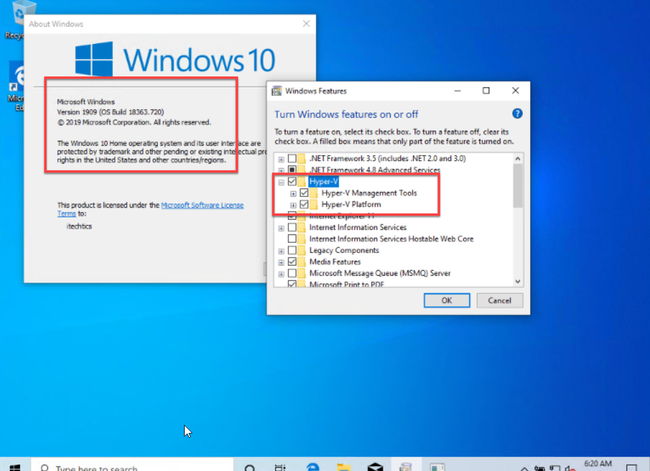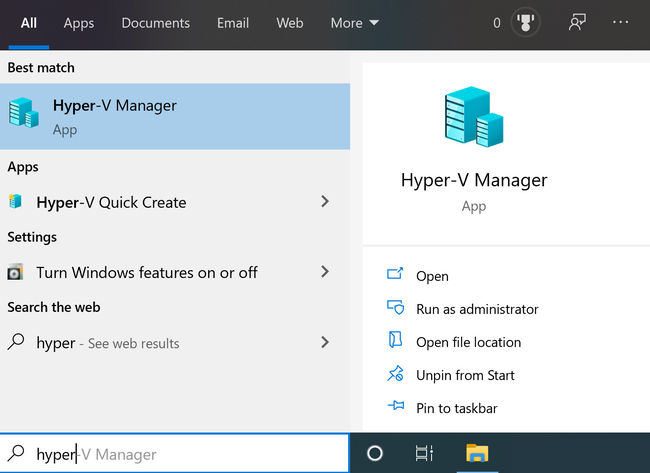How to Check if Hyper V Is Enabled Windows 10
Hyper-V is Microsoft's virtualization platform. It is available on Windows Server Operating Systems but Microsoft has added the Hyper-V functionality to Windows 8.1 and Windows 10.
Unfortunately, the Hyper-V feature is only available in Windows 10 Professional and Enterprise editions. You can't install it on Windows 10 Home Edition by default.
However, using the steps in this article, we'll show you how to enable Hyper-V in the Windows 10 Home edition.
Does your system support virtualization?
Before moving forward, we need to check if our system supports virtualization. Hardware virtualization is required for Hyper-V to function correctly. Otherwise, you can use other virtualization platforms like Virtualbox and VMWare.
There are four basic requirements for Hyper-V to be installed on a Windows 10 computer:
- VM Monitor Mode Extensions
- Virtualization enabled in firmware
- Second level address translation
- Data execution prevention
You can check all these requirements by opening the Command Prompt (Run –> cmd) and running the systeminfo command. You can check the Hyper-V requirements section.

Most modern computers support all the requirements of Hyper-V. But some systems have virtualization disabled from BIOS. You can go to the BIOS setup computer at the startup and enable Virtualization.

Enable Hyper-V in Windows 10 Home
Follow the steps below to install and enable Hyper-V in Windows 10 Home.
- Download Hyper-V Enabler from here:
Hyper-V installer and enabler for Windows 10 Home (317 bytes, 33,092 hits)
- Once downloaded, right-click on the file and select Run as Administrator. This will trigger the installation script. It may take some time to complete the installation. Please let it complete without interruption.

- Once complete, press Y to continue. The system will restart.

- You will see the Windows updates screen upon restart.

- After restarting, you can check if the Hyper-V option is visible in Windows Optional Features. To check, go to Run –> optionalfeatures. You will find Hyper-V and Hyper-V Management tools.

You can search for Hyper-V in the start menu to start creating virtual machines on your Windows 10 Home computer.

I noticed an interesting thing that Hyper-V was installed within a virtual machine. So I could create a virtual machine within a virtual machine.
Disable Hyper-V from Windows 10 Home
If you don't want this functionality in your computer, you can always disable it. There are two ways to disable:
- Go to Run –> optionalfeatures. This will open the Optional Features window.
- Uncheck Hyper-V and Hyper-V management tools.
- Restart the computer.
You can also do this using the command-line:
PowerShell
Disable-WindowsOptionalFeature -Online -FeatureName Microsoft-Hyper-V -All
Command Prompt
DISM /Online /Disable-Feature /All /FeatureName:Microsoft-Hyper-V
Sometimes Hyper-V is very useful even for home users. It can be used to test and evaluate new software without hurting the host system. But there are times when enabling virtualization support or installing Hyper-V is not recommended.
Hyper-V requires some system resources to run its virtual machines. For example, if you have 4 GB RAM, you won't be able to give any resources to the virtual machine. So it would not be wise to enable Hyper-V functionality.
For what purpose do you want to enable Hyper-V functionality on your Windows 10 Home computer? Please share your thoughts in the comments below.
Also see:
Usman Khurshid
Usman Khurshid is a seasoned IT Pro with over 15 years of experience in the IT industry. He has experience in everything from IT support, helpdesk, sysadmin, network admin, and cloud computing. He is also certified in Microsoft Technologies (MCTS and MCSA) and also Cisco Certified Professional in Routing and Switching.
How to Check if Hyper V Is Enabled Windows 10
Source: https://www.itechtics.com/enable-hyper-v-windows-10-home/
0 Response to "How to Check if Hyper V Is Enabled Windows 10"
Post a Comment